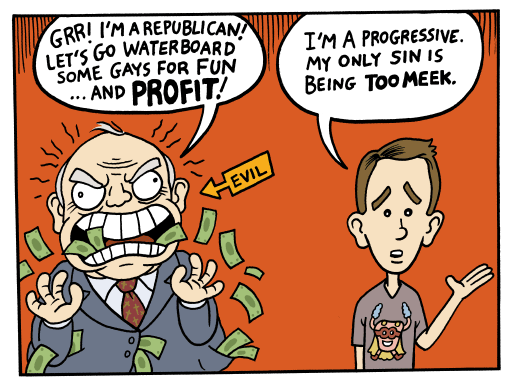Category Archives: Espresso
How you imagine a thing.
🚨GIF ALERT🚨 #MisfitMischief
Goat gifs…don't question it, just do it! pic.twitter.com/jhvO1aMCA7
— MisfitPolitics (@MisfitsPolitics) June 10, 2017
How a thing actually goes.
— Mo Mo (@molratty) June 10, 2017
On Meaning, Identity Politics and Bias in the Academy — An Interview with Clay Routledge | Quillette
As I previously noted, ideological bias can influence research and most academics, especially in the social sciences and humanities, are on the political left. This leads to groupthink and reduces the amount of scrutiny certain research receives and the debate it inspires. And it can bias every step of the research process. It can influence the choice of research questions, the way scales or questionnaires are worded, the specific outcomes measured, the decision to publish or not publish results, the amount of criticism the research receives in the peer-review process, the topics of selected research symposia at conferences, what projects receive grant funding, and so on.
Viewpoint diversity helps because we rely on peers to challenge us, to debate our ideas and point out the biases and flaws in our research. In research that does not touch on social or political issues, we often see considerable debate, people offering alternative hypotheses or questioning particulars of the research design and statistical tests. This always improves the quality of the work and helps us get closer to the objective truth. But people seem to go a little or a lot easier on research that touches on sensitive social or political topics, or supports leftist ideology. I have seen this firsthand. I have been at talks where people present very poorly conducted research related to ideas that failed to replicate or were never well-supported to begin with and watched as hardly anyone in the audience offered even the slightest challenge. It is very strange to see well-trained scientists so blatantly ignore fundamental research flaws because they find the conclusion ideologically affirming. This is precisely why we need to make our methods more rigorous, fight for an academic culture that challenges groupthink and prioritizes the pursuit of truth over tribal loyalty, and encourage diversity of thought.
A lot of bias discussion center around whether it’s fair to conservatives or not. This is, ultimately, beside the point. Conservatives have done a lot to themselves to damage their standing. But even if they have, and even if we argue that they deserve to be frozen out, it doesn’t follow that it’s good for the institution that is doing the freezing.
iStock really, really doesn’t want shoplifters to be black.
Megan McArdle and Pascal Emmanuel-Gobry both look at the wonder of the Utah, the red state that accomplishes a lot of Democratic aims (at the expense of others).
Well, I wouldn’t say “Pro-life” exactly, but the story behind Semisonic’s “Closing Time” is nonetheless interesting.
Robert Innis tries to navigate the relationship between vapers and smokers (and Public Health).
It’s interesting reading about education debates in other countries. Even somewhat similar Britain. Or maybe especially so.
First they will say that the thing they don’t want you doing is dangerous to you. When you tell them it isn’t or that you don’t care, they will tell you it is dangerous to others. When you demonstrate that it isn’t dangerous to others, they will tell you that it’s bad for “society.” They will offer exactly no evidence for any of their claims because, in their eyes, moral superiority is its own evidence. But your evidence they will subject to the highest scrutiny before dismissing it out of hand.
(I have probably been guilty of this. Worth keeping in mind.)
Facebook failed to remove sexualised images of children – BBC News
The National Society for the Prevention of Cruelty to Children (NSPCC) also voiced concern.
“Facebook’s failure to remove illegal content from its website is appalling and violates the agreements they have in place to protect children,” said a spokeswoman.
“It also raises the question of what content they consider to be inappropriate and dangerous to children.”
The BBC first asked Facebook for an interview about its moderation system in late-2015, and repeated the request following this follow-up investigation.
The social network’s director of policy Simon Milner agreed to be interviewed last week, on condition the BBC provided examples of the material that it had reported, but had not been removed by moderators.
The BBC did so, but was reported to the UK’s National Crime Agency as a consequence.
This story is almost comical.
I can't stop watching this gif. Watch everyone avoid Oklahoma for as long as possible pic.twitter.com/kbFPb9ZHe6
— Comfortably Smug (@ComfortablySmug) March 31, 2017
I have been listening to the works of Harlan Coben lately. On the whole, he’s a great storyteller and his novels are very gripping. My main complaint is that at the end of each standalone novel, he has one last twist that makes things worse rather than better. In two of the three cases, it’s a left-field “you were never going to guess that” sort of thing, which is fine… but one of the reasons you never would have guessed it is that the behavior of the characters prior to the revelation makes less rather than more sense. In one case, it turns out throughout the entire novel the narrator had very pertinent information to the case never affected his thinking throughout. In all three cases, the story would have been better if they’d gone with the penultimate theory of crime (or equivalent).

